before(时间状语从句)
时间状语从句Before-After-Until-Since.doc
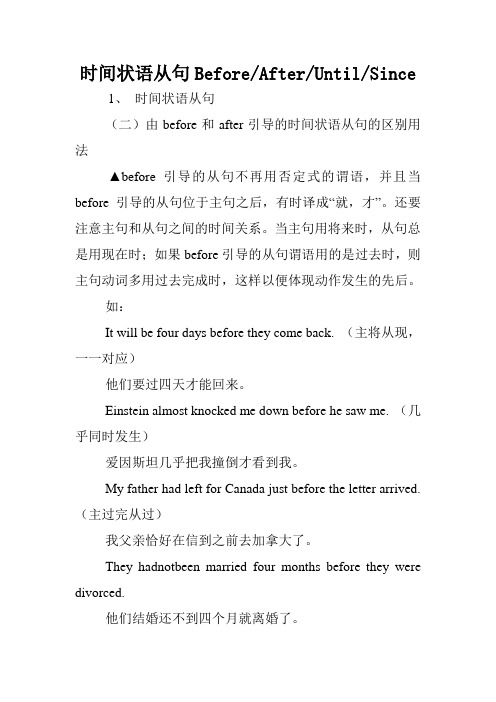
时间状语从句Before/After/Until/Since1、时间状语从句(二)由before和after引导的时间状语从句的区别用法▲before引导的从句不再用否定式的谓语,并且当before 引导的从句位于主句之后,有时译成“就,才”。
还要注意主句和从句之间的时间关系。
当主句用将来时,从句总是用现在时;如果before引导的从句谓语用的是过去时,则主句动词多用过去完成时,这样以便体现动作发生的先后。
如:It will be four days before they come back. (主将从现,一一对应)他们要过四天才能回来。
Einstein almost knocked me down before he saw me. (几乎同时发生)爱因斯坦几乎把我撞倒才看到我。
My father had left for Canada just before the letter arrived. (主过完从过)我父亲恰好在信到之前去加拿大了。
They hadnotbeen married four months before they were divorced.他们结婚还不到四个月就离婚了。
▲after表示主句动作发生在从句动作之后。
主句和从句的动作的时间关系正好与before引导的从句相反。
如:After you think it over, please let me know what you decide.你仔细考虑过以后,告诉我你是怎样决定的。
After we had finished the work, we went home.完成工作之后,我们回家了。
(从句用过去完成时,主句用一般过去时)(三)till或until引导的时间状语从句的区别till和until 一般情况下两者可以互换,但是在强调句型中多用until。
但要注意的是:①如果主句中的谓语动词是瞬时动词时,必须用否定形式;②如果主句中的谓语动词是延续性动词时,用肯定或否定形式都可以,但表达的意思不同。
before的时间状语从句

before的时间状语从句"Before"常常用作引导时间状语从句,用来表示在某个动作或事件发生之前的时间关系。
时间状语从句通常由连词引导,紧跟在主句之后,从句中的动作或事件发生在主句中的动作或事件之前。
例如,“Before I go to bed, I always brush my teeth.”(在我上床睡觉之前,我总是刷牙。
)在这个例句中,“Before I goto bed”就是一个时间状语从句,它说明了刷牙动作发生的时间。
在句子中,时间状语从句可以出现在主句之前或之后,具体位置取决于强调的重点。
如果时间状语从句出现在句首,通常需要用逗号与主句隔开,如,“Before the meeting starts, I need to prepare the documents.”(在会议开始之前,我需要准备文件。
)而如果时间状语从句出现在句尾,通常不需要逗号分隔,如,“I need to prepare the documents before the meeting starts.”。
另外,需要注意的是,当时间状语从句中的动作与主句中的动作同时发生时,通常要使用现在完成时态或者一般现在时态,以表示这种时间关系。
例如,“I will call you before I have finished my work.”(在我完成工作之前,我会给你打电话。
)这里的时间状语从句“before I have finished my work”和主句中的动作“will call”并不是严格的先后关系,而是同时发生的关系。
总的来说,“before”的时间状语从句能够帮助我们更清晰地表达动作或事件发生的时间关系,让句子的逻辑关系更加明确。
Before的详细用法总结

Before的详细用法总结今天给大家带来Before的用法,我们一起来学习吧,下面就和大家分享,来欣赏一下吧。
Before的用法我们最初接触的Before一般是作为介词使用的,一般表示空间上的“在…之前” 。
例如:The tea has been set before her.茶已经摆在她面前了。
Before作为介词时,需要注意的是,一般不用在表示具体时间的词之前。
比如,两年之前,我们用two years ago,而不能说.efore two years.Before作为介词时,有一个特殊用法需要注意,即before long 表示“不久之后”。
例如:Before long he got married.不久之后他就结婚了。
Before作为连词时,一般意为“在…之前”,用来引导时间状语从句。
引导的从句中的动作一般发生在主句动作之后。
Before作为连词时的用法较为复杂,具体要点如下:一、主句用一般现在时/一般将来时,从句用一般现在时。
例如:You should let me explain what I did before you criticize me.在你批评我之前,你应该让我解释一下我做过什么。
二、主句用过去完成时,从句用一般过去时。
一般翻译为“在…之前就… ”。
例如:1.His father had died before he was born.他父亲在他出生之前就已经去世了。
2.She had finished her homework before her mother returned.她在妈妈返回之前就已经把作业完成了。
三、主句用一般过去时,从句用过去完成时。
从句用过去完成时表示一个过去没有完成或没来得及做的、时间顺序在后的动作,常译为“★还没(来得及)…就…★ ”。
例如:1.He rushed out of the office before I had realized what was happening.我还没意识到发生了什么事,他就冲出去了。
before用法归纳
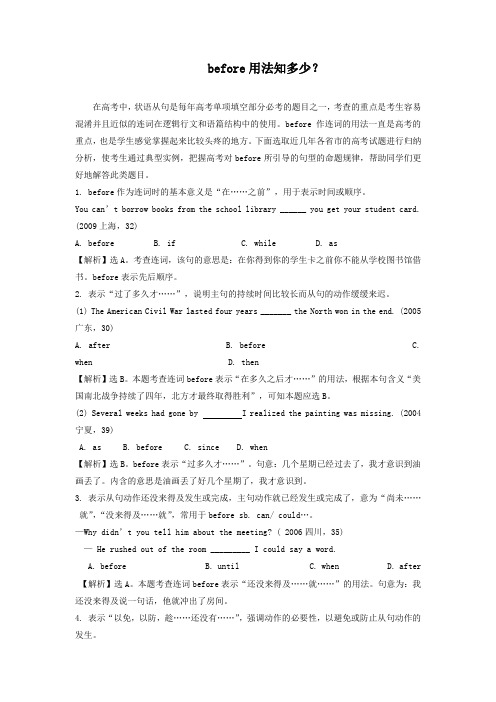
before用法知多少?在高考中,状语从句是每年高考单项填空部分必考的题目之一,考查的重点是考生容易混淆并且近似的连词在逻辑行文和语篇结构中的使用。
before作连词的用法一直是高考的重点,也是学生感觉掌握起来比较头疼的地方。
下面选取近几年各省市的高考试题进行归纳分析,使考生通过典型实例,把握高考对before所引导的句型的命题规律,帮助同学们更好地解答此类题目。
1. before作为连词时的基本意义是“在……之前”,用于表示时间或顺序。
You can’t borrow books from the school library ______ you get your student card. (2009上海,32)A. beforeB. ifC. whileD. as【解析】选A。
考查连词,该句的意思是:在你得到你的学生卡之前你不能从学校图书馆借书。
before表示先后顺序。
2. 表示“过了多久才……”,说明主句的持续时间比较长而从句的动作缓缓来迟。
(1) The American Civil War lasted four years _______ the North won in the end. (2005广东,30)A. afterB. beforeC. whenD. then【解析】选B。
本题考查连词before表示“在多久之后才……”的用法,根据本句含义“美国南北战争持续了四年,北方才最终取得胜利”,可知本题应选B。
(2) Several weeks had gone by I realized the painting was missing. (2004宁夏,39)A. asB. beforeC. sinceD. when【解析】选B。
before表示“过多久才……”。
句意:几个星期已经过去了,我才意识到油画丢了。
内含的意思是油画丢了好几个星期了,我才意识到。
3. 表示从句动作还没来得及发生或完成,主句动作就已经发生或完成了,意为“尚未……就”,“没来得及……就”,常用于before sb. can/ could…。
It-…+点时间段时间+before…诠释
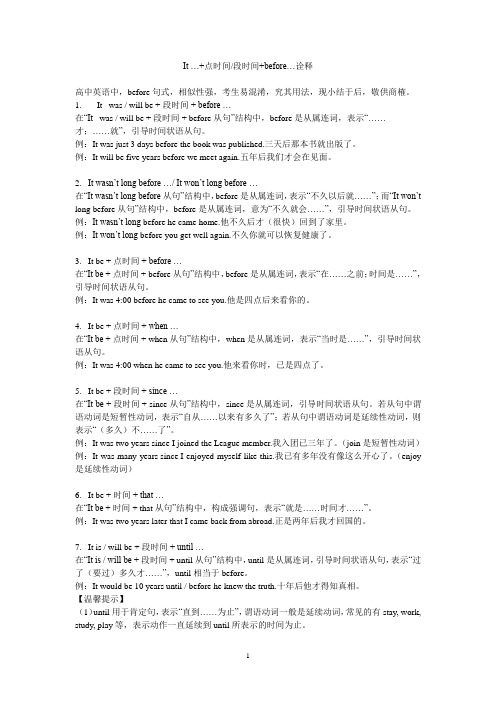
It …+点时间/段时间+before…诠释高中英语中,before句式,相似性强,考生易混淆,究其用法,现小结于后,敬供商榷。
1. It was / will be + 段时间+ before …在“It was / will be + 段时间 + before 从句”结构中,before是从属连词,表示“……才;……就”,引导时间状语从句。
例:It was just 3 days before the book was published.三天后那本书就出版了。
例:It will be five years before we meet again.五年后我们才会在见面。
2. It wasn’t long before …/ It won’t long before …在“It wasn’t long before从句”结构中,before是从属连词,表示“不久以后就……”;而“It won’t long before从句”结构中,before是从属连词,意为“不久就会……”,引导时间状语从句。
例:It wasn’t long before he came home.他不久后才(很快)回到了家里。
例:It won’t long before you get well again.不久你就可以恢复健康了。
3. It be + 点时间+ before …在“It be +点时间 + before从句”结构中,before是从属连词,表示“在……之前;时间是……”,引导时间状语从句。
例:It was 4:00 before he came to see you.他是四点后来看你的。
4. It be + 点时间+ when …在“It be +点时间 + when从句”结构中,when是从属连词,表示“当时是……”,引导时间状语从句。
例:It was 4:00 when he came to see you.他来看你时,已是四点了。
Unit4Grammar时间状语从句语法复习牛津译林版英语九年级上册
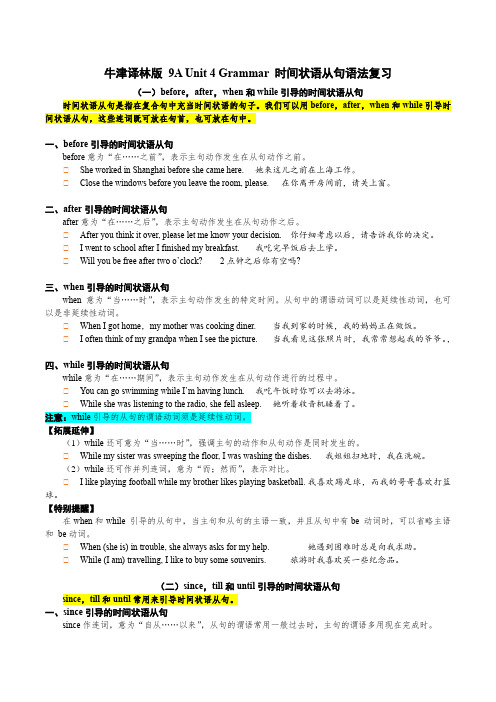
牛津译林版9A Unit 4 Grammar 时间状语从句语法复习(一)before,after,when和while引导的时间状语从句时间状语从句是指在复合句中充当时间状语的句子。
我们可以用before,after,when和while引导时间状语从句,这些连词既可放在句首,也可放在句中。
一、before引导的时间状语从句before意为“在……之前”,表示主句动作发生在从句动作之前。
▶She worked in Shanghai before she came here.她来这儿之前在上海工作。
▶Close the windows before you leave the room, please.在你离开房间前,请关上窗。
二、after引导的时间状语从句after意为“在……之后”,表示主句动作发生在从句动作之后。
▶After you think it over, please let me know your decision.你仔细考虑以后,请告诉我你的决定。
▶I went to school after I finished my breakfast.我吃完早饭后去上学。
▶Will you be free after two o’clock?2点钟之后你有空吗?三、when引导的时间状语从句when意为“当……时”,表示主句动作发生的特定时间。
从句中的谓语动词可以是延续性动词,也可以是非延续性动词。
▶When I got home,my mother was cooking diner.当我到家的时候,我的妈妈正在做饭。
▶I often think of my grandpa when I see the picture.当我看见这张照片时,我常常想起我的爷爷。
,四、while引导的时间状语从句while意为“在……期间”,表示主句动作发生在从句动作进行的过程中。
▶You can go swimming while I’m having lunch.我吃午饭时你可以去游泳。
before 时间状语从句句型
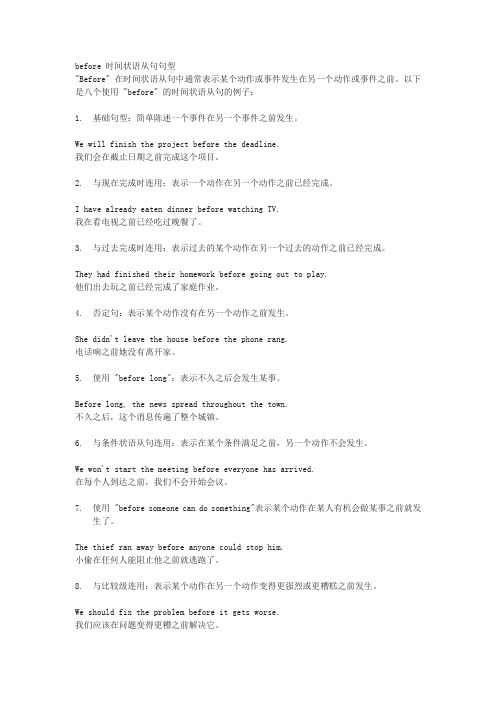
before 时间状语从句句型"Before" 在时间状语从句中通常表示某个动作或事件发生在另一个动作或事件之前。
以下是八个使用 "before" 的时间状语从句的例子:1.基础句型:简单陈述一个事件在另一个事件之前发生。
We will finish the project before the deadline.我们会在截止日期之前完成这个项目。
2.与现在完成时连用:表示一个动作在另一个动作之前已经完成。
I have already eaten dinner before watching TV.我在看电视之前已经吃过晚餐了。
3.与过去完成时连用:表示过去的某个动作在另一个过去的动作之前已经完成。
They had finished their homework before going out to play.他们出去玩之前已经完成了家庭作业。
4.否定句:表示某个动作没有在另一个动作之前发生。
She didn't leave the house before the phone rang.电话响之前她没有离开家。
5.使用 "before long":表示不久之后会发生某事。
Before long, the news spread throughout the town.不久之后,这个消息传遍了整个城镇。
6.与条件状语从句连用:表示在某个条件满足之前,另一个动作不会发生。
We won't start the meeting before everyone has arrived.在每个人到达之前,我们不会开始会议。
7.使用 "before someone can do something"表示某个动作在某人有机会做某事之前就发生了。
The thief ran away before anyone could stop him.小偷在任何人能阻止他之前就逃跑了。
Before 从 句 的 翻 译
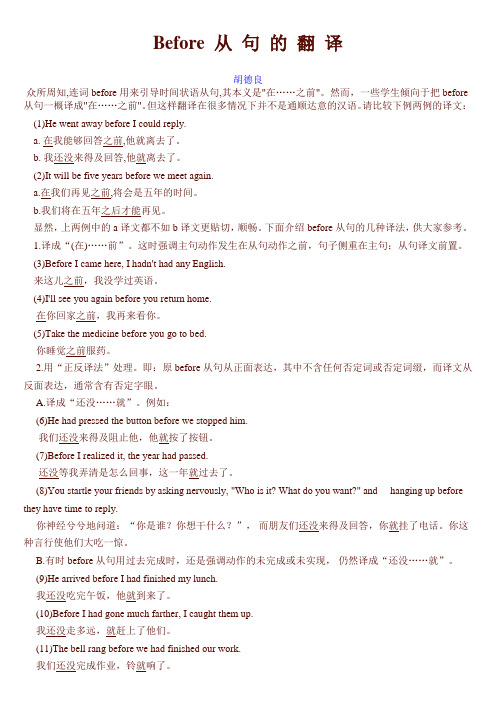
Before 从句的翻译胡德良众所周知,连词before用来引导时间状语从句,其本义是"在……之前"。
然而,一些学生倾向于把before 从句一概译成"在……之前"。
但这样翻译在很多情况下并不是通顺达意的汉语。
请比较下例两例的译文:(26)My mother often gets up before I do.母亲经常比我起得早。
7.在"Hardly(Scarcely)…before…"句型中,译成“(刚)一……,就……”。
这时,before = when。
(27)Hardly had we got to the station before the train left.我们刚到火车站,火车就开了。
(28)Hardly had the operator pressed the button before all the machines began to work.操作人员一按电钮,所有的机器就开始运行。
(29)Scarcely had he gone out before it began to rain.他一出去,就下起雨来了。
8.不用译出。
这时,原文的主句常用否定形式,从句后置,其译文也后置。
(30)It was not long before he came.他不久就来了。
(31)I had not gone a mile before I felt tired.没有走到一英里路,我已经疲倦了。
(32)They had not proceeded far before they perceived a bear making toward them with great rage.他们没走多远,就看到了一头大熊愤怒地朝他们而来。
9.少数情况下,译成“……,最后……”。
这时,一系列有序的动作在前,从句处末尾,其译文也处于最后。
(33)They left Tennessee and headed east, stopping in Louisville and Lexington in Kentucky, and then wandering north through Cincinnati, Columbus and Dayton, Ohio, and then back west through Indianapolis before they came back by way of Nashville.他们离开田纳西州,朝东进发。
- 1、下载文档前请自行甄别文档内容的完整性,平台不提供额外的编辑、内容补充、找答案等附加服务。
- 2、"仅部分预览"的文档,不可在线预览部分如存在完整性等问题,可反馈申请退款(可完整预览的文档不适用该条件!)。
- 3、如文档侵犯您的权益,请联系客服反馈,我们会尽快为您处理(人工客服工作时间:9:00-18:30)。
1. The elephant, big, go through the door The elephant is too big to go through the door. The elephant isn’t small enough to go through the door. 2.The girl, short, reach the apple. The girl is too short to reach the apple. The girl isn’t tall enough to reach the apple. 3. The cat runs, slowly, catch the mouse. The cat runs too slowly to catch the mouse. The cat doesn’t run fast enough to catch the mouse.
when, after, before(时间状语从句) (时间状语从句) 1.当他到过家里的时候,她稍微休息了一下。 当他到过家里的时候,她稍微休息了一下。 当他到过家里的时候 When she reached home, she had a short rest. 2.你做完作业才能离开。 你做完作业才能离开。 你做完作业才能离开 Don’t leave before you finish your homework. Don’t leave until you finish your homework. 3.你跟你父母亲谈了之后,请给我打个电话。 你跟你父母亲谈了之后,请给我打个电话。 你跟你父母亲谈了之后 Please give me a ring after you talk to your parents.
Lesson Ninety-two The Ninety-second Lesson
点播
pre-questions: 1. Where is Kate? She is in bed. 2. What’s wrong with Kate? Her head hurts. 3. Can she eat anything before she goes to see the doctor? No, she mustn’t.
1. Mary called Tom at four thirty this afternoon. Who called Tom at four thirty this afternoon? 2.He is using Li Mei’s knife. Whose knife is he using? 3. She worked at the hospital for ten hours yesterday. How long did she work at the hospital yesterday? 4. He comes from France. Where does he come from? 5.They had their meeting in Room 302. Where did they have their meeting? 6.He got up at six this morning. What time did he get up this morning?
1.不要嘲笑别人,好吗? 不要嘲笑别人,好吗? 不要嘲笑别人 Don’t laugh at other people, will you? 2.两天后,我们终于到达了那个小镇。 两天后,我们终于到达了那个小镇。 两天后 Two days later we reached that small town at last. 3.我们花了两个多小时才完成那项工作。 我们花了两个多小时才完成那项工作。 我们花了两个多小时才完成那项工作 It took us more than two hours to finish the work. 4.你要花多长时间才能看完这本书? 你要花多长时间才能看完这本书? 你要花多长时间才能看完这本书 How long will it take you to finish reading that book? 5.你千万不要这么早离开。 你千万不要这么早离开。 你千万不要这么早离开 You mustn’t leave so early. 6. 我现在感觉更好些了。 我现在感觉更好些了。 I feel a little better now.
If (条件状语从句) 条件状语从句) 条件状语从句 1. 如果他来了,我会告诉你。 如果他来了,我会告诉你。 I’ll tell you if he comes. If he comes, I’ll tell you. 2.如果明天我有空,我就跟你一起去。 如果明天我有空,我就跟你一起去。 如果明天我有空 If I’m free tomorrow, I’ll go with you. I’ll go with you if I’m free tomorrow. 3.如果明天不下雨,我就到那里去。 如果明天不下雨,我就到那里去。 如果明天不下雨 If it doesn’t rain tomorrow, I’ll go there. I’ll go there if it doesn’t rain tomorrow.
